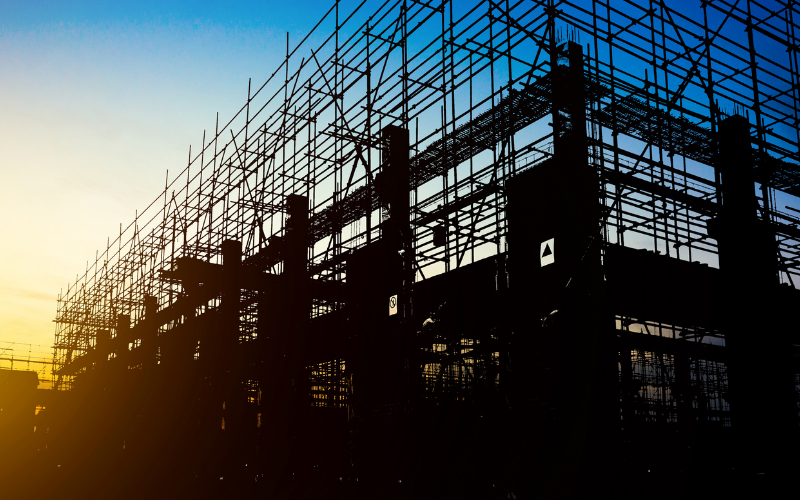What Is Geotechnical Engineering?
Geotechnical engineering is a branch of civil engineering that deals with soil, rock, and everything else in the earth. Geotechnical engineering is essential for commercial construction. Otherwise, the project is at risk of damage due to unsuitable soil and improper mitigation. After all, we know all buildings start on the ground.
We are Koury Engineering, a Southern California based geotechnical engineering firm. We offer comprehensive geotechnical engineering services, from reports to lab testing to field tests. We want every project to succeed safely and last for years to come.
Understanding Geotechnical Engineering
Geotechnical engineering combines knowledge from several scientific disciplines. We use all the following fields to understand soil and how soil will move in the future. It’s then we can help civil engineers design an appropriate foundation for the commercial construction site that will support the building for decades to come.
Soil Mechanics
Soil mechanics is a branch of physics and requires intense study. We use the applied version in geotechnical engineering. This field is concerned about the properties and behavior of the soil. Using this knowledge, we can predict whether the soil will move.
Soil mechanics differs from solid or fluid mechanics. Soil instead contains solids, fluids, and organic materials in a non-homogenized mix. We need to study internal friction, cohesion, compressibility, elasticity, permeability, and capillarity during soil testing before making recommendations to our commercial construction partners.
Rock Mechanics
The rock mechanics field examines the deformations and stresses on rocks. We use this to determine if a given rock or rock bed can support the weight of a commercial construction project. These deformations tell us a lot regarding how much weight we can put on a given rock.
Rock mechanics is a complex geotechnical engineering field. We use many distinct methods before making a recommendation, such as instrumentation, field testing, theoretical analysis, and lab testing.
Geophysics
Geophysics is a study of the earth on a broader scale using both theoretical and physical methods. We use this field when we’re assessing the risks during a major natural event, such as an earthquake. We need to build commercial construction to stand through these events.
The field of geophysics does a significant amount of mapping. We can use existing maps as well as fresh data collection to determine if a commercial construction project is at an increased risk based on its location.
Hydrogeology
This field is the study of groundwater. We need to understand how groundwater moves through a commercial construction site to make reliable geotechnical engineering decisions. Otherwise, the soil may wash out or expand more than the building can handle.
Hydrogeology focuses on how water enters the ground and where it goes once it does. We can find and measure these flows. Then, a skilled geotechnical engineer designs a way to ensure the commercial site remains dry and that excess diverts from problem areas in the future.
Geology
Geology focuses on the materials that make up the earth. They look at the history of the globe in hopes of understanding the processes. We use this field to better understand how the soil and rock have behaved in the past. This insight helps us predict how the ground will move under the same conditions in the future.
The Necessity of Geotechnical Engineering in Commercial Construction
There are two primary reasons to include geotechnical engineering in a commercial construction project. The first is the obvious, financial, since a geotechnical engineering report can detect many soil problems. This prevents costly discoveries mid-project resulting in delays. These discoveries tend to be expensive to fix, especially if discovered near the end of the construction timeline. The second is less tangible. While we find the Leaning Tower of Pisa charming, we want the buildings in Southern California to stand straight, tall, and proud for generations to come. It’s part of the pride we take in our community.
Geotechnical Engineering Reports
Geotechnical engineering reports are a way for commercial construction managers to know if the site they want is actually feasible for the building they want. Without a geotechnical engineering survey, anything could be a few inches under the soil, and we’ve seen that blow the budget of commercial construction projects often.
The first step in the geotechnical engineering report process is a visual survey of the land. Some geotechnical engineering features are best observed before a site is disturbed. We send out a professional geotechnical engineering team, so we miss nothing.
Once the initial survey of the area is complete, we will drill. We typically do this with machines, so it’s fast and precise. Some geotechnical engineers prefer the feel of a manual auger for the sample collection phase.
We then analyze the soil samples we take at the Koury Engineering fully accredited geotechnical engineering lab. We use cutting edge equipment combined with a well-trained staff supervised by certified geotechnical engineers to get results. We promise our analysis will be useful and timely.
From there, we produce the actual report. This report contains all the data a commercial construction manager could ask for, along with recommendations for fixing any geotechnical engineering problems. This way, everyone is on the same page.
Foundation Engineering
In some cases, the geotechnical engineering report comes back, and the building foundation plans do not need changes. However, more often, Southern California soil demands we advise commercial construction building plan changes. Otherwise, the whole product is at risk of repetitive damage.
With any foundation project, our priority is safety both now and in the future. These are followed by performance and economy. The economy applies to money and construction efficiency.
One of the big items with commercial construction projects is the weight of the finished building. Soils can only handle so much weight before they start significantly shifting. Some soils are more resilient than others, but we know big construction projects require a lot more load consideration.
The key to a secure building is distributing that weight through the foundation appropriately. The choice begins at whether a building needs a shallow or deep foundation. Shallow foundations also come in spread, strip, or matt. We use the information gathered on what the soil can handle to choose the best variety of foundation. The other important factor with sites is the slope. Even a small incline can cause havoc if it is not accounted for. Gradients facilitate water and soil movement, which is terrible for foundations. We’ve seen enough materials washed away from foundations that the buildings lean.
The trick with this is mitigating as much as possible. We want to divert as much water as possible from the foundations, so the soil stays in place. Fortunately, modern engineering has provided a plethora of tools. We analyze which would be best for the purpose and only recommend those that we believe work with the area.
Consultation
Koury Engineering also provides field tests and consultation after a commercial construction project is complete. We offer this service on request. We come out, analyze the problem facing the building, and consult throughout the process of fixing it. Whether the soil moved or a natural disaster happened, we love helping out our commercial partners.
Why Geotechnical Engineering Matters in Southern California
Southern California can be a tricky place for commercial construction projects. Our soil is wildly varied, and our natural disasters are the stuff of national news. Nevertheless, we wouldn’t want to live anywhere else. Instead, we help commercial construction withstand all these tests.
Stability
The most significant piece of geotechnical engineering in California is ensuring commercial construction project stability. Between the soils and the natural disasters, the right foundation is key to keeping building tall for the future. However, it’s challenging to have the right foundation without geotechnical engineering. Many of our soils are inherently unstable. They are responsive to increases in water, such as the rains. We know the soils expand rather than remaining in place. This would cause stress on foundations, mainly if they were not designed with this load in mind.
Unique Soil Mix
Southern California has a wonderful mix of soils, as anyone who has tried to garden knows. However, that same mix makes it difficult to offer a one size fits all geotechnical engineering solution. We serve all of Southern California, and we know it’s a lot of mixes. The other issue is individual sites. There is no way to tell without doing a geotechnical engineering survey if the soil mix on a property is the same as what’s listed on the soil maps for that area. Without precise site data, we would only be guessing.
Asphalt Changes Everything
One unfortunate fact of living in Southern California is the asphalt. It’s here to stay now, but it has wide-ranging geotechnical engineering implications. For starters, asphalt laying removes many of the plants we know hold soil in place. Plus, water simply rolls over asphalt if the drainage is not set up correctly.
We need complex analysis to ensure foundations are safe from the effects of asphalt. Not only are we contending with the current pavement, but we must also manage all the other construction work that may have happened on or near a commercial construction site. That’s part of why a comprehensive geotechnical engineering report is essential here.
The Hills
Southern California is not flat in most places, which means we must consider slopes. Dirt is naturally affected by gravity over long periods, and it will move downhill. We make careful plans for buildings anywhere near a hill simply on account of this erosion. The other factor with the hills of Southern California is water erosion. Water erodes faster than gravity alone, so we try to divert as much as possible away from foundations. However, we do also make alternate plans when the water exceeds our estimations.
The Earthquake Question
The last factor in commercial construction in Southern California is the next big earthquake. While we do not know when it is coming, we know it will happen eventually. Geotechnical engineering can help foundations meet the current earthquake regulations and withstand the big one when it comes.
Conclusion
Geotechnical Engineering is a complex discipline. Each decision must weight many factors, from the survey to the foundation. We at Koury Engineering are proud to meet the engineering needs of our neighbors for a stronger and safer commercial construction future.


